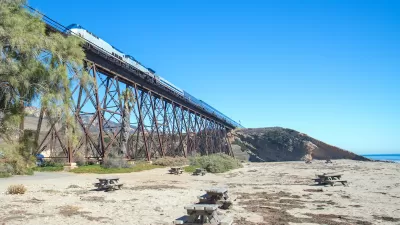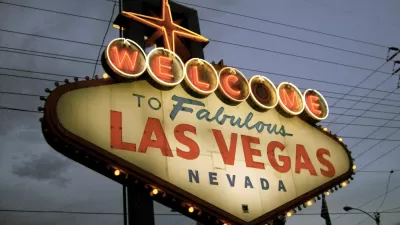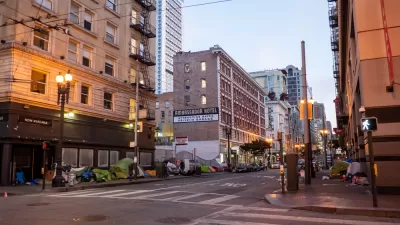California voters will soon vote on a $10 billion bond proposal that would fund a 220 mph bullet train running between L.A. and San Francisco.
"If Californians approve the $10 billion bond proposal – enough to provide initial financing for the $42 billion system that could link north and south through the agricultural Central Valley –they will likely see the zooming trains in about a decade."
"The price tag may sound ominous in shaky financial times. But the project could turn out to be half the cost of alternatives, proponents say. They calculate that the additional 13.5 million people expected to reside in California within 20 years will result in 90 million to 115 million more intercity or region-to-region trips. Supporting the travelers would require at least $82 billion in upgrades, including 2,970 additional miles of freeway lanes, 90 new airport gates, and five new runways."
"Previous statewide votes on the train were readied, then taken off ballots in 2004 and 2006. In 2004, the reason was a large state deficit that required a bailout bond measure, and in 2006, Gov. Arnold Schwarzenegger placed one of the state's largest infrastructure bond measures before voters. He and other state legislators did not want any romantic notions of speeding bullet trains competing for voters' attention."
"This year, the state has a budget deficit of $16 billion, which could dampen enthusiasm for the train, but the California High-Speed Rail Authority, the proposal sponsor, has secured promises of federal matching funds and funding from public/private partnerships, and a 30-40 percent profit margin."
FULL STORY: Bullet train coming to California ballots

Planetizen Federal Action Tracker
A weekly monitor of how Trump’s orders and actions are impacting planners and planning in America.

Maui's Vacation Rental Debate Turns Ugly
Verbal attacks, misinformation campaigns and fistfights plague a high-stakes debate to convert thousands of vacation rentals into long-term housing.

San Francisco Suspends Traffic Calming Amidst Record Deaths
Citing “a challenging fiscal landscape,” the city will cease the program on the heels of 42 traffic deaths, including 24 pedestrians.

Defunct Pittsburgh Power Plant to Become Residential Tower
A decommissioned steam heat plant will be redeveloped into almost 100 affordable housing units.

Trump Prompts Restructuring of Transportation Research Board in “Unprecedented Overreach”
The TRB has eliminated more than half of its committees including those focused on climate, equity, and cities.

Amtrak Rolls Out New Orleans to Alabama “Mardi Gras” Train
The new service will operate morning and evening departures between Mobile and New Orleans.
Urban Design for Planners 1: Software Tools
This six-course series explores essential urban design concepts using open source software and equips planners with the tools they need to participate fully in the urban design process.
Planning for Universal Design
Learn the tools for implementing Universal Design in planning regulations.
Heyer Gruel & Associates PA
JM Goldson LLC
Custer County Colorado
City of Camden Redevelopment Agency
City of Astoria
Transportation Research & Education Center (TREC) at Portland State University
Jefferson Parish Government
Camden Redevelopment Agency
City of Claremont





























